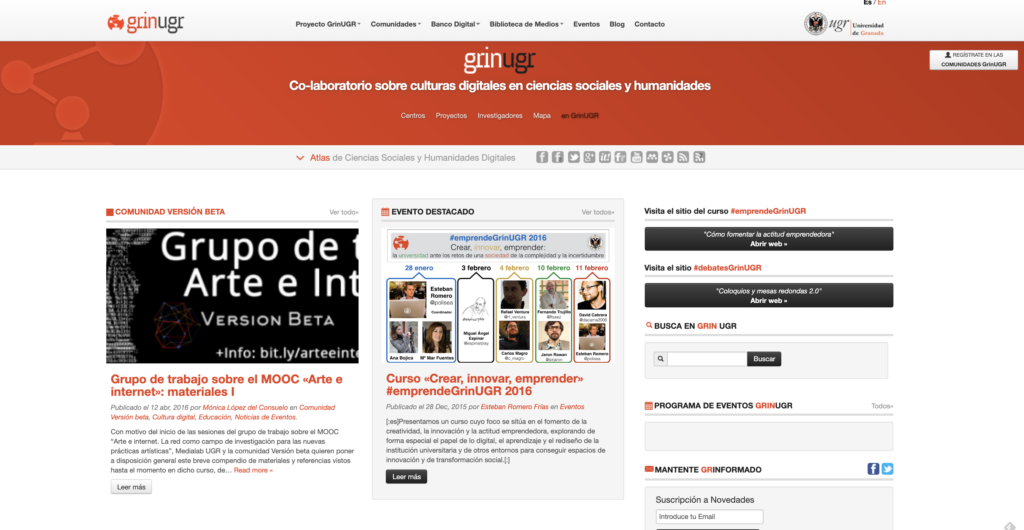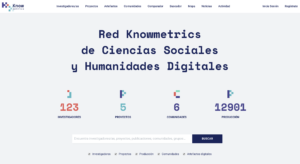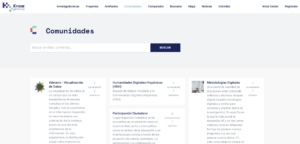Digital Humanities Labs
Informe Final-InfluScience: Científic@ s socialmente influyentes: un modelo para medir la transferencia del conocimiento en la sociedad digital (InfluCiencia)
Who influences policy labs in the European Union? A social network approach
Gender-based stereotyping in the Spanish artisan sector
Who influences policy labs in European Union? A social network approach
Arqus Openness Position Paper
Neural blockchain technology for a new anticorruption token: towards a novel governance model
Blockchain technology currently represents a great opportunity for e-government in general and for public procurement in particular, given their financial implications and potential political and social risks. Blockchain technology facilitates the procedures and processes of administrative records via smart contracts because of properties such as timeproof sealing and data record immutability. In the present paper, we present a truthfulness governance approach which uses a permissioned model based on neural blockchain technology and smart contracts to create blocks within which all information is held in an on-chain consensus system to avoid corruption in the field of public procurement. Our proposal represents a scalable, efficient, innovative solution that is aligned with Sustainable Development Goal requirements and constitutes a ‘Decentralized Autonomous Organization’ in itself. Our model highlights the benefits of blockchain technology in terms of transparency, immutability, security, inclusiveness and disintermediation in order to create new anticorruption policies and technical solutions.
Encuentro entre la pedagogía y las humanidades en la sociedad digital
The impact of flow, satisfaction and reputation on loyalty to MOOCs: the moderating role of extrinsic motivation
2. Encuentro entre la pedagogía y las humanidades en la sociedad digital
BlockLab
The BlockLab of the University of Granada was born within the framework of a cooperative, transformative and evolutionary project from MediaLab UGR – Research Laboratory for Culture and Digital Society, belonging to the Vice-Rector’s Office for Institutional Policy and Planning, and the MYDASS research group (Modeling and Development of Advanced Software Systems) of the Department of Computer Languages and Systems of the Higher Technical School of Computer Engineering and Telecommunications (ETSIIT) of the University of Granada.
In order to promote the launch of the Alastria Consortium Node (alastria.io), working with Hyperledger Fabric networks (and BESU) of our university, we make available to the university community, and society in general, a space for meeting, research, experimentation and innovation in which to explore the new frontiers of the digital shifting.
Also, we have access to the first existing Neural Distributed Ledger, a 4th generation blockchain. In the BlockLab we will launch a RETIS node as a testnet in collaboration with ByEvolution, the company that has developed this disruptive DLT.
1. Why the BlockLab of the MediaLab?
BlockLab is the UGR meeting point for any person, company or entity interested in the innovative potential of distributed ledger technologies; and especially, in its cultural, social and economic implications. Its setting within Medialab UGR (https://medialab.ugr.es/) responds to the transversal potential of this space in the university and in society from its conception of an open social laboratory for learning, research and experimentation around to the impact that digital technologies have on culture, economy, and on society as a whole. From these key points, there is already extensive experience in the development of co-creative innovation processes in various fields, including setting an example through initiatives such as Laboratory 717 – Laboratory of participation and democratic innovation in Andalusia (https: / /laboratorio717.org) or LabIN Granada – Granada Citizen Innovation Laboratory (https://labingranada.org). We also encourage the international cooperation within the academy and the companies.
BlockLab is organized as a laboratory of ideas, experimentation and exchange of projects, based on the philosophy of blockchain and ethical hacking; with two fundamental axes to develop changes in society: Cooperation and (co)creation.
Its main objective is to become a repository of information, experiences, code and training to create a Hub that fosters the creation of blockchain-based solutions in order to both provide innovative solutions to traditional problems and anticipate and respond to new challenges resulting from the interaction of the multiple technologies of the 4th Industrial Revolution.
In line with what we do at MediaLab UGR, special emphasis will be placed on the development of new democratic formats, citizen participation and innovation, from a multidisciplinary and disruptive perspective.
All the projects and formats that are born within this framework of action will be aligned with the 17 Sustainable Development Goals, and their 169 Goals, of the United Nations 2030 Agenda.
2. Who can participate?
The BlockLab is not conceived as a professional forum, but as a physical and virtual meeting space for social innovators, disruptive minds and people dedicated to the world of research and the professional world as well as citizens, who share the interest of, from multiple perspectives and disciplines of knowledge, develop projects that use this technology as a vector to solve specific governance problems, improving processes and drawing new forms of organization. In short, the aim is to contribute to designing a disintermediated society based on the trust of its members in those areas that are critically determined.
Amongst the blocklabers are:
- People who contribute technological knowledge, both in the conceptualization of the technology itself and in the code that develops it; especially to develop an own community that spreads the training in the languages of the technologies of distributed registry (DLTs).
- Communities of professionals who want to expand their knowledge about these technologies and their application in their environments; especially the Spin-Offs and Start-Ups.
- People who are social leaders and want to help transform the old schemas of processes and participation of our democracies and systems of governance in organizations.
- People anxious to learn and / or transmit knowledge about these technologies to improve our society.
- People interested in developing a new ethic, ethical hacking for machines and algorithms with the help of blockchain.
3. What projects and activities do we develop at BlockLab?
As a cooperative and cocreative community we will set the limits between all the blocklabers, but by way of illustration we propose:
- Specific training on certain technologies, processes or programming languages in the field of blockchain.
- Development of an ethical hacking structure in relation to the possibilities offered by the blockchain.
- Organization of debates, workshops and seminars, either of general dissemination and / or academic to deepen the challenges that the decentralization of our society entails.
- Evaluation, design and testing of technologies in our Alastria Node or in those spaces that we help to create.
- Collaborative prototyping on new processes and strategies on how to achieve ethical systems of disintermediation for society that improve the democratic quality of our organizations.
Comunicaciones Orales.-Primeros avances sobre el estudio de los conflictos de valores en las relaciones entre padres e hijos. Estudio preliminar sobre la acogida en la vida …
Independent publishers and social networks in the 21st century: the balance of power in the transatlantic Spanish-language book market
Exploring how student motivation relates to acceptance and participation in MOOCs
A neural blockchain for a tokenizable e-Participation model
Desarrollo de una dApp basada en blockchain para procesos de eDemocracia
En cooperación con la empresa ByEvolution estamos desarrollando una aplicación descentralizada dentro de la red de Blockchain RETIS, llamada VoteKeeper para facilitar los procesos democráticos en entornos locales, con el fin de garantizar su anonimización, seguridad, incorruptibilidad de los datos y un sellado de tiempo eficaz.
Para ello se utilizará una dApp desde la que se podrá votar con un smarphone o tablet, o con una solución front end, desde la web municipal.
En este proyecto colabora el MediaLab de la UGR y el Grupo de Investigación MYDASS de la misma universidad de la ETSIIT.
Science through Wikipedia: A novel representation of open knowledge through co-citation networks
The Impact of Sharing Economy in Heritage Neighborhoods in Granada
Análisis de las causas endógenas y exógenas del abandono escolar temprano: una investigación cualitativa. Educación XXI, 22 (1), 263-293
A la intemperie
Informe final del Foro Albaicín y Sacromonte sobre Turismo Sostenible 2018
Mapping the backbone of the Humanities through the eyes of Wikipedia
The “Tokenization” of the eParticipation in Public Governance: An Opportunity to Hack Democracy
Currently Distributed Ledger Technologies-DLTs, and especially the Blockchain technology, are an excellent opportunity for public institutions to transform the channels of citizen participation and reinvigorate democratic processes. These technologies permit the simplification of processes and make it possible to safely and securely manage the data stored in its records. This guarantees the transmission and public transparency of information, and thus leads to the development of a new citizen governance model by using technology such as a BaaS (Blockchain as a Service) platform. G-Cloud solutions would facilitate a faster deployment in the cities and provide scalability to foster the creation of Smart Citizens within the philosophy of Open Government. The development of an eParticipation model that can configure a tokenizable system of the actions and processes that citizens currently exercise in democratic environments is an opportunity to guarantee greater participation and thus manage more effective local democratic spaces. Therefore, a Blockchain solution in eDemocracy platforms is an exciting new opportunity to claim a new pattern of management amongst the agents that participate in the public sphere.
El futuro de la formación universitaria en auditoría, contabilidad y finanzas ante la transformación digital
GrinUGR – Colaboratorio sobre culturas digitales en ciencias sociales y humanidades
La denominación GrinUGR surge en 2011 como acrónimo de “GRupo de INternet de la Universidad de GRanada”. En 2013, si bien se mantiene dicha denominación se redefine como Colaboratorio sobre culturas digitales en ciencias sociales y humanidades. GrinUGR surgía como respuesta a la falta de una reflexión crítica sobre las culturas digitales que se asumían desde la universidad en la docencia, la investigación y en el modo de generar espacios compartidos entre la academia y el resto de la sociedad. GrinUGR – Colaboratorio sobre culturas digitales en ciencias sociales y humanidades se configura como una infraestructura abierta para el desarrollo de proyectos vinculados a la cultura digital abierta y conectada, la cultura del prototipado y el conocimiento abierto. Desde finales de 2015, año en que se funda Medialab UGR – Laboratorio de Investigación en Cultura y Sociedad Digital en la Universidad de Granada, su actividad queda en suspenso, transfiriendo algunas de sus iniciativas a este nuevo espacio.
- Test: La denominación GrinUGR surge en 2011 como acrónimo de “GRupo de INternet de la Universidad de GRanada”. En 2013, si bien se mantiene dicha denominación se redefine como Colaboratorio sobre culturas digitales en ciencias sociales y humanidades. GrinUGR surgía como respuesta a la falta de una reflexión crítica sobre las culturas digitales que se asumían desde la universidad en la docencia.

Red Knowmetrics de Ciencias Sociales y Humanidades Digitales
La Red Knowmetrics es una red que integra dos enfoques con el fin de contribuir a dar visibilidad y reconocimiento a estas líneas de investigación:
- Enfoque tradicional, fundamentalmente cuantitativo y centrado en contribuciones en formatos clásicos: artículo, libro, etc. Se ha tomado Google Scholar como referente con el fin de que un investigador, disponiendo de un perfil en esta red, pueda incorporar automáticamente sus contribuciones y métricas.
- Enfoque digital, con el fin de que cada investigador/a pueda subir artefactos digitales describiéndolos y visualizándolos, proporcionando información cualitativa.
Igualmente permite incluir perfiles de otras redes digitales no científicas, particularmente Twitter. La red permite también visualizar un mapa global para geolocalizar estos investigadores.


